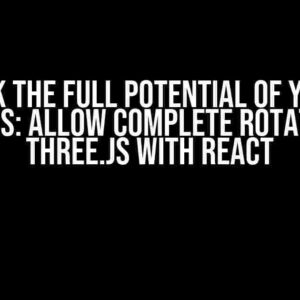Hey there, Unity developers! Are you tired of dealing with pesky garbage collection (GC) issues in your projects? You’re not alone! In this article, we’re going to dive into a common issue that’s been plaguing many developers: why TextMeshPro makes GC when called SetCharArray. Buckle up, because we’re about to get to the bottom of this mystery!
What is TextMeshPro?
Before we dive into the meat of the issue, let’s quickly cover what TextMeshPro is. TextMeshPro is a powerful, high-performance text rendering system for Unity. It’s designed to provide advanced text rendering capabilities, including font rendering, layout, and styling. It’s widely used in Unity projects, from UI elements to in-game text rendering.
What is SetCharArray?
SetCharArray is a method in TextMeshPro that sets the character array of a text element. It’s commonly used to update the text content of a UI element or in-game text. The method takes a character array as an argument, which is then used to render the text.
The Problem: Why TextMeshPro Makes GC When Called SetCharArray?
So, why does TextMeshPro make GC when called SetCharArray? To understand this, let’s take a look at what happens under the hood.
When you call SetCharArray, TextMeshPro creates a new string from the character array. This new string is then used to render the text. The issue arises because the character array is not stored in the TextMeshPro object itself. Instead, it’s stored in a separate object, which is created and garbage collected every time SetCharArray is called.
This means that every time you call SetCharArray, a new object is created, which leads to garbage collection. And, as we all know, garbage collection can be a major performance killer in Unity projects.
Why is GC a Problem?
So, why is garbage collection a problem? Well, here are a few reasons:
- Performance Impact: Garbage collection can cause significant performance issues, including frame drops, stuttering, and even crashes.
- Memory Leaks: If garbage collection is not properly handled, it can lead to memory leaks, which can cause your game or application to consume more and more memory over time.
- Inconsistent Behavior: Garbage collection can lead to inconsistent behavior, such as text elements not updating correctly or UI elements becoming unresponsive.
Solutions to the Problem
So, how can we avoid GC when calling SetCharArray? Here are a few solutions:
Solution 1: Use a Singleton TextMeshPro Object
One solution is to use a singleton TextMeshPro object that’s created only once and reused throughout your project. This way, the character array is stored in the same object, and you avoid creating new objects every time you call SetCharArray.
<code>
public class TextMeshProSingleton : MonoBehaviour
{
private static TextMeshProSingleton instance;
public static TextMeshProSingleton Instance
{
get { return instance; }
}
private TextMeshPro textMesh;
void Awake()
{
if (instance == null)
{
instance = this;
textMesh = gameObject.AddComponent<TextMeshPro>();
}
else
{
Destroy(gameObject);
}
}
public void SetText(string text)
{
textMesh.SetCharArray(text.ToCharArray());
}
}
</code>
Solution 2: Use a Pool of TextMeshPro Objects
Another solution is to use a pool of TextMeshPro objects that are created at startup and reused throughout your project. This way, you avoid creating new objects every time you call SetCharArray.
<code>
public class TextMeshProPool : MonoBehaviour
{
private List<TextMeshPro> pool;
void Start()
{
pool = new List<TextMeshPro>();
for (int i = 0; i < 10; i++)
{
GameObject obj = new GameObject();
TextMeshPro textMesh = obj.AddComponent<TextMeshPro>();
pool.Add(textMesh);
}
}
public TextMeshPro GetTextMesh()
{
foreach (TextMeshPro textMesh in pool)
{
if (!textMesh.gameObject.activeInHierarchy)
{
return textMesh;
}
}
return null;
}
public void SetText(TextMeshPro textMesh, string text)
{
textMesh.SetCharArray(text.ToCharArray());
}
}
</code>
Solution 3: Use a Custom Text Rendering System
If you’re feeling adventurous, you can create a custom text rendering system that avoids GC altogether. This requires a deep understanding of Unity’s text rendering pipeline, but it’s definitely possible.
| Method | Pros | Cons |
|---|---|---|
| Singleton TextMeshPro Object | Easy to implement, low overhead | Limited flexibility, may not be suitable for complex projects |
| Pool of TextMeshPro Objects | Flexible, scalable, and efficient | More complex to implement, requires careful management |
| Custom Text Rendering System | Ultimate flexibility and control, zero GC | Highly complex, requires deep understanding of Unity’s text rendering pipeline |
Conclusion
In conclusion, TextMeshPro’s SetCharArray method can cause GC issues due to the creation of new objects every time it’s called. However, by using a singleton TextMeshPro object, a pool of TextMeshPro objects, or a custom text rendering system, we can avoid GC and ensure smooth performance in our Unity projects.
Remember, garbage collection is a common issue in Unity development, but with the right strategies and techniques, we can overcome it and create high-performance, GC-free applications.
Thanks for reading, and happy coding!
Frequently Asked Question
Are you tired of seeing the Garbage Collector (GC) kicking in every time you call SetCharArray on TextMeshPro? Well, you’re not alone! Let’s dive into the reasons behind this phenomenon and explore some possible solutions.
Why does TextMeshPro trigger the Garbage Collector when I call SetCharArray?
When you call SetCharArray on TextMeshPro, it creates a new string object in memory, which leads to garbage collection. This is because SetCharArray modifies the internal character array of the TextMeshPro object, causing the old array to be garbage collected.
Is there a way to avoid garbage collection when calling SetCharArray?
Yes, you can avoid garbage collection by reusing the same character array instead of creating a new one. You can achieve this by calling SetCharArray with a char array that you’ve allocated beforehand, and then reusing that array every time you call SetCharArray.
Why does TextMeshPro need to create a new string object every time I call SetCharArray?
TextMeshPro creates a new string object every time you call SetCharArray to ensure that the internal character array is up-to-date and reflects the latest changes. This is necessary because TextMeshPro uses a complex font rendering system that requires the character array to be updated dynamically.
Can I use a StringBuilder instead of calling SetCharArray repeatedly?
Yes, you can use a StringBuilder to concatenate your characters and then call SetCharArray once with the final string. This approach can help reduce garbage collection and improve performance, especially when dealing with large amounts of text.
Are there any other optimization techniques I can use to reduce garbage collection with TextMeshPro?
Yes, besides reusing character arrays and using StringBuilder, you can also consider using object pooling, caching, and reducing the frequency of SetCharArray calls. Additionally, you can profile your application to identify the root cause of garbage collection and optimize accordingly.






